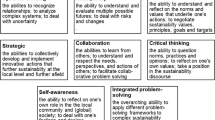Abstract
Educational reforms contend that to build vested student interest in sustainability issues, students need enhanced sustainability literacy skills. We believe that the connection between Education for Sustainable Development and public change in behavior and action will become more prevalent when students are afforded personal community-based connections to the environment. In this chapter, we discuss how the framework of Critical Environmental Agency could be used to align this personal connection with Education for Sustainable Development. We present a case study of a teacher professional development program as an example of how this alignment was strengthened, which led to enhanced content and pedagogical practices. The program was designed for middle school and high school science teachers from rural school districts in geographic regions whose watersheds flowed to the Gulf of Mexico. The challenges experienced by rural science teachers presented in this case study, though less severe, nod to the similar experiences of teachers of the Global South where perspectives of educators and learners need to be heard and valued. The findings from this study lead us to shift the way we plan for Continuous Professional Development experiences and work to encourage implementation in rural classrooms.
Access this chapter
Tax calculation will be finalised at checkout
Purchases are for personal use only
Similar content being viewed by others
References
Beckman, P. J. & Gallo, J. (2015). Rural education in a global context. Global Education Review, 2(4). 1-4.
Calabrese Barton, A. & Tan, E. (2008). Where da heat go? Develo** critical science agency through student-directed science documentaries on urban heat islands. In Annual meeting of the American Educational Research Association. New York, NY.
Di Minin, E., Correia, R. A., & Toivonen, T. (2021). Conservation geography. Trends in Ecology & Evolution.
Evans, S., Stevenson, R.B., Lasen, M., & Ferrire, J.L. (2017). Approaches to embedding sustainability in teacher education: A synthesis of the literature. Teaching and Teacher Education, 63, 405-417. https://doi.org/10.1016/j.tate.2017.01.013
Federal Communications Commission (FCC). (2021). Broadband availability. https://broadbandmap.fcc.gov/#/
Greenwood, D. A. (2012). A critical theory of place-conscious education. In R. Stevenson, M. Brody, J. Dillon, & A. Wals (Eds.), International handbook of research on environmental education (pp. 83–100). Routledge.
Grimm, N. B., Foster, D., Groffman, P., Grove, J. M., Hopkinson, C. S., Nadelhoffer, K. J., & Peters, D. P. (2008). The changing landscape: ecosystem responses to urbanization and pollution across climatic and societal gradients. Frontiers in Ecology and the Environment, 6(5), 264-272.
Hirt, M. R., Barnes, A. D., Gentile, A., Pollock, L. J., Rosenbaum, B., Thuiller, W., & Brose, U. (2021). Environmental and anthropogenic constraints on animal space use drive extinction risk worldwide. Ecology Letters.
Huffling, L.D. (2015) Critical environmental agency in a field ecology program. University of North Carolina at Greensboro.
Huffling, L.D. & Scott, H. (2021). Using critical environmental agency to engage teachers in local watersheds through water quality citizen science. Water, 13(2), 205. https://doi.org/10.3390/w13020205
Leicht, A., Heiss, J., & Byun, W.J. (2018). Issues and trends in sustainability education. UNESCO. https://en.unesco.org/sites/default/files/issues_0.pdf
Nagendra, H. (2018). The global south is rich in sustainability issues. Nature, 557, 485-488.
Nolet, V. (2009). Preparing sustainability-literate teachers. Teachers College Record, 111(2), 409-442.
North American Association for Environmental Education (NAAEE). (2011). Develo** a framework for assessing environmental literacy. North American Association for Environmental Education.
Santone, S., Saunders, S., & Seguin, C. (2014). Essential elements of sustainability in teacher education. Journal of Sustainability, 6.
Tan, E., Calabrese Barton, A., Turner, E., & Gutiérrez, M. V. (2012). Empowering science and mathematics education in urban schools, Tan, Barton, Turner. The University of Chicago Press.
UN (2015). Transforming our World: The 2030 Agenda for Sustainable Development. https://sdgs.un.org/publications/transforming-our-world-2030-agenda-sustainable-development-17981
Vitousek, P. M., Mooney, H. A., Lubchenco, J., & Melillo, J. M. (1997). Human domination of earth’s ecosystems. Science, 277(5325), 494–499. https://doi.org/10.1126/science.277.5325.494
Wang, C. C., & Burris, M. a. (1997). Photovoice: Concept, methodology, and use for participatory needs assessment. Health Education & Behavior, 24(3), 369–387. https://doi.org/10.1177/109019819702400309
Warren, A.E., Archambault, L.M., & Foley, R.W. (2014). Sustainability education framework for teachers: Develo** literacy through futures, values, systems, and strategic thinking. Journal of Sustainability Education, 6.
Wilson, R. J., & Fox, R. (2021). Insect responses to global change offer signposts for biodiversity and conservation. Ecological Entomology, 46(4), 699-717.
Grant Disclaimer
Research reported in this publication was supported by the Gulf Research Program of the National Academies of Sciences, Engineering, and Medicine under the Grant Agreement number 2000009821. The content is solely the responsibility of the authors and does not necessarily represent the official views of the Gulf Research Program or the National Academies of Sciences, Engineering, and Medicine.
Author information
Authors and Affiliations
Corresponding author
Editor information
Editors and Affiliations
Rights and permissions
Copyright information
© 2022 The Author(s), under exclusive license to Springer Nature Switzerland AG
About this chapter
Cite this chapter
Huffling, L.D., Scott, H.C., Rushing, S. (2022). Incorporating Education for Sustainable Development Into Teachers’ Continuous Professional Development Through Critical Environmental Agency. In: Öztürk, M. (eds) Educational Response, Inclusion and Empowerment for SDGs in Emerging Economies. Sustainable Development Goals Series. Springer, Cham. https://doi.org/10.1007/978-3-030-98962-0_13
Download citation
DOI: https://doi.org/10.1007/978-3-030-98962-0_13
Published:
Publisher Name: Springer, Cham
Print ISBN: 978-3-030-98961-3
Online ISBN: 978-3-030-98962-0
eBook Packages: EducationEducation (R0)




